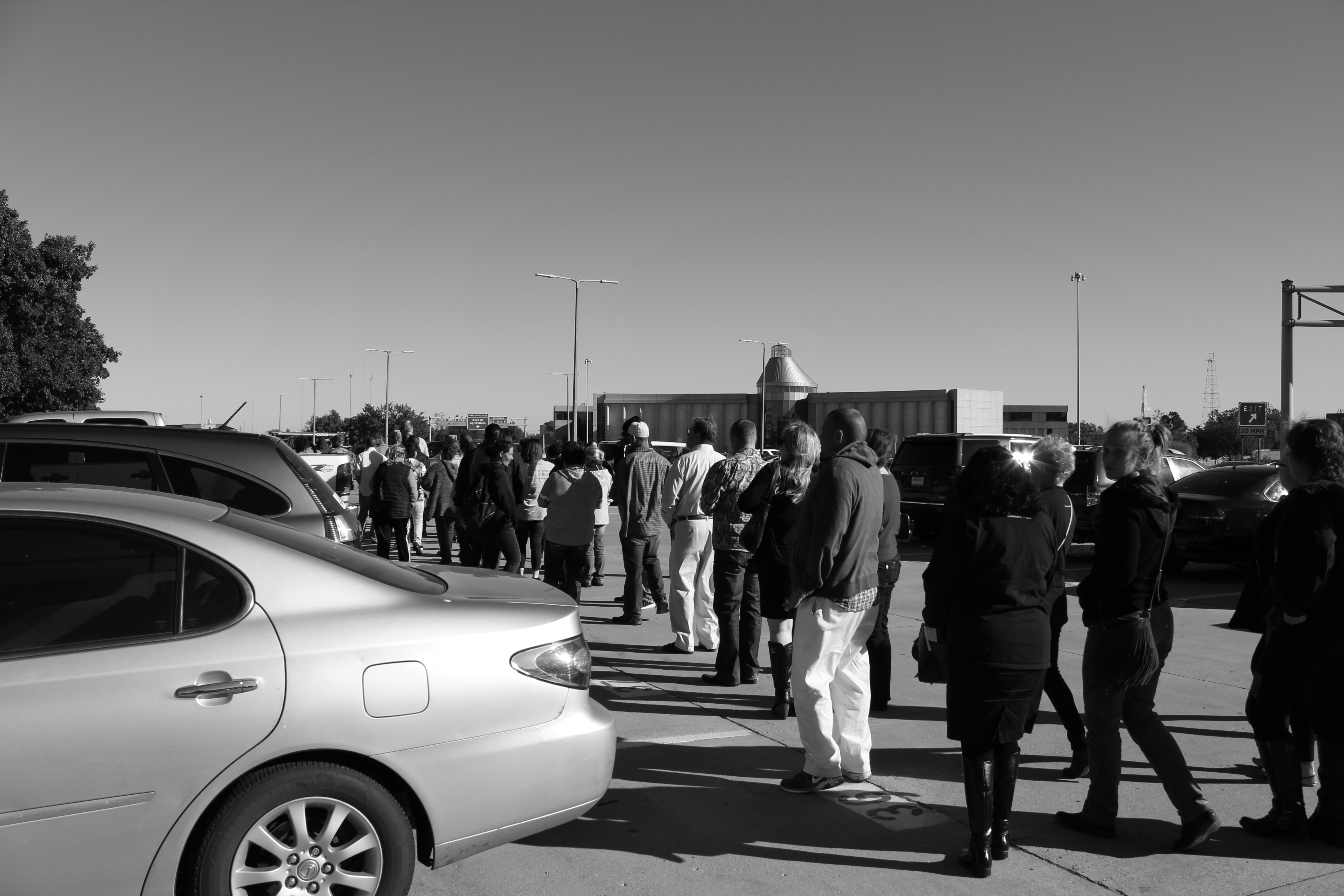Budget Update: People will die without services

A new budget proposal offered by the Republican leadership of the Oklahoma House of Representatives relies too heavily on sales tax, the House’s Democratic leader said.
Ex-House Minority Leader Scott Inman, D-Oklahoma City, criticized the GOP plan to fill the $300 billion dollar hole. Inman said the refusal by Republican leaders to support a bipartisan budget solution which fairly spreads the burden of raising adequate funding “borders on immoral.”
This comment comes just days after the Oklahoma Department of Human Services decided to end funding for child abuse Contractors. The agency said It’s expected to save $3 million for next fiscal year.

Inman said his proposal could have prevented cuts from core services. He said a bipartisan plan proposed by him and House Speaker Charles McCall, R-Atoka, had the potential to raise $500 million in recurring revenue.
The plan called for an increase in the state’s gross production tax to 5 percent, and a restoration of the Earned Income Tax Credit in exchange for an $1.50 increase in cigarette taxes.
Since then Inman said, the GOP majority has decided to counter the bipartisan budget proposal by increasing sales tax. The new budget, he said, also proposes “an income tax increase for one half of a percent of millionaires.
McCall said DHS’s announcement was one reason why his bill to audit agency budgets every four years was so important for taxpayers. McCall said the bill would require the Legislative Service Bureau to audit or contract with a third-party auditor to audit agency budgets every four years.
“Frankly, I am perplexed as to why an agency that could afford these programs last year would claim it can no longer afford them this year after receiving a $53 million increase from taxpayers,” McCall said in a press release. “This is an agency that received $700 million in taxpayer dollars last session. We worked diligently during the legislative session to meet the needs of the agency as Director Lake requested, so this announcement to cut programs is surprising to say the least.”
McCall said every state agency owes citizens an explanation for the ways they spend taxpayer dollars.
Last Fiscal year DHS funding was cut by over one percent along with the Department of Mental Health and Substance Abuse, or ODMHSAS, which was cut by three percent.
The mid-year adjustment for fiscal year 2017 illustrates ODMHSAS was cut by over two percent. A $2 million difference between the fiscal year of 2016.
The proposed FY 2018 budget from February showed an overall seven percent increase from last fiscal year.
The Oklahoma Department of Mental Health and Substance Abuse Services announced plans eliminating all state-funded outpatient services statewide, a spokesman for the agency said.
“We announced our cuts last week saying we were going to cut all outpatient services statewide,” Jeff Dismukes, Director of Communications for Oklahoma Department of Mental Health and Substance Abuse said. “So we’re still moving forward with that.”
He said the process to cut outpatient services started when they announced it last week.
“If we have funding before November first,” he said. “Then we don’t have to actually initiate those processes, but if we receive funding by December first then we don’t have to implement the cuts.”
However, he said, on December first the department will run out of money, “We are six million dollars short as of December first, even more so come January first.
Gabriel Martinez, Oklahoma City, said he would be heartbroken if he lost his health insurance if the budget proposal doesn’t pass on time.
“I would usually never go to the doctor because I could barely afford a doctor’s trip,” Martinez said. “I’d only go unless i was really sick or something was wrong with me like where I knew I wouldn’t get better soon kinda stuff.”
Martinez said he receives Metlife health insurance through his employer, but even then he said the co pays were too much.
“If I go see a doctor with insurance yeah it’d be cheaper but with all these bills like rent, my car payment every month, utility bills and groceries,” he said. “I honestly can’t find the money to go see a doctor.”
Dismukes said the situation is “tricky”, because cuts to the department will affect insurers who receive state funding like medicaid.
The Department said it had decided to cut services because of the 75 million that was “ripped” from the budget after the cigarette tax was decided unconstitutional this summer by the Supreme Court of Oklahoma.
In May the agency expressed concerns for the cuts effects earlier this year, but remained thankful for what was being done at the time. Mental health officials said the amount of funding needed to maintain current service levels and meet federal behavioral health Medicaid state share requirements would be $330.9 million.
The recent cuts will make them lose 23 percent of their budget, and over $100 million in matching federal funds, they stated.
Dismukes said if no additional funds are created the agency will have to cut the outpatient services, Systems of Care, PACT and Psychiatric residential care facilities for children will be cut affecting those seeking medication and workers.
“That includes 189,000 Oklahomans currently receiving outpatient services, 700 treatment agencies in communities statewide and more than 8,500 therapists, case managers, doctors and nurses, not to mention hundreds of support staff,” he said.

They said the cuts would “decimate” Oklahoma’s behavioral health care system, but these cuts are what they said is necessary to avoid losing help for those acutely ill.
The department said the Legislature has until November to generate revenue for state services, otherwise the cuts will be implemented in January.
This week Republican Governor Mary Fallin released a statement on the budget agreement. “Senate President Pro Tempore Mike Schulz and House Speaker Charles McCall today reached an agreement adjusting the 2018 fiscal year budget that, among other things, helps fill the $215 million budget hole and puts Oklahoma on a more stable budget path, as well as provides a needed teacher pay raise,” the governor said.
The proposed budget would fill the hole by using sales tax as a means of revenue, including:
- Place a $1.50 tax on a package of cigarettes.
- Provide for a 6-cent fuel tax increase.
- Revise taxes on alcoholic beverages.
- Restore the Earned Income Tax credit.
- Provide for a $3,000 teacher pay increase, effective Aug. 1, 2018.
- Provide for a $1,000 increase for state employees, effective Aug. 1, 2018. It does not pertain to higher education, legislators or constitutional officers, such as statewide elected officials and judges.
Fallin said it’s imperative legislators seek sustainability over “unpredictability and volatility.”
“This agreement makes more recurring revenue available, helps us stop balancing our budget with one-time funds, and provides a teacher pay raise as well as a raise for our hard-working state employees, who have not had an across-the-board pay increase in eleven years,” Fallin said. “And, most importantly, it provides sufficient revenues to meet the basic responsibilities of state government, such as education, health and public safety.”
Fallin said legislators must give the people what they need and avoid retiring to partisan ideals. House Speaker Charles McCall said the proposal should restore funding for Mental Health Services.
“We believe this plan gives us the best opportunity to pass the House and Senate, and provide the state with needed revenue to stabilize mental health and substance abuse programs, keep rural hospitals open, and provide a pay raise that would make Oklahoma teachers the highest paid in the region for starting pay,” he said.
During the budget meetings Inman said all efforts to avoid relying on sales tax were “dismissed.”
“I was told that, even though the Speaker’s team had offered it as part of the compromise, a 5 percent gross production tax on new wells was simply unacceptable to House Republican Leadership,” Inman said in a statement. “On behalf of my caucus, I then offered to accept 4.5 percent on new wells for the first 18 months of the well or even 4 percent for the first 12 months of the well.”
Representatives of the state’s oil and gas industry touted the energy sector’s contribution to the state’s economy.
“The energy industry kept Oklahoma’s unemployment rate well below the national average and sustained our State’s essential public services,” a letter from the oil and gas industry said. “The energy industry kept Oklahoma’s unemployment rate well below the national average and sustained our state’s essential public services.”
Officials with the Oklahoma Policy Institute said the state’s structural budget problems will not be solved while lawmakers insist on asking nothing from the wealthiest households and most profitable businesses in our state.
This proposal simply continues the political grandstanding that has prevented the obvious, popular, and fair solution preferred by a large majority of Oklahomans, the institute said.
Representative Forrest Bennett D-Oklahoma City, said the proposed budget is “unbelievable” and it left out the Democrats plan.
“After Dems spent months negotiating in good faith, GOP just walked away and announced their own terrible plan,” Bennett wrote on the social media site, Twitter. “I’m learning about this plan like everyone else – from the news. I guess they’ve decided to ignore the people’s plea for compromise.”
An analysis by Oklahoma Watch shows that each day that lawmakers don’t pass the $1.50-per-pack cigarette tax would cost the state between $680,305 and $712,265 in potential new revenue, depending on what calculations the state uses.
The budget, proposed during the first week of special session, would have generated $128.9 million for the current fiscal year, the organization said.
In response to the recent cuts to DHS and the Oklahoma Department of Mental Health and Substance Abuse Services more than 5000 people were went to the Capitol building Tuesday afternoon.
Hope Community Services, an organization to assist low income Oklahomans with mental health disorders, decided to engage in the protest. “Save our state” echoed throughout the Capitol building during the rally.
An employee for ODMHSAS who asked not to be named, said more than 2000 people came to encourage legislators to come to a budget agreement. The urgency, the employee said, is because there is such a large gap legislators will have to fix it by november.
“First with a plan, most outpatient and substance abuse services will no longer be able to be provided,” the employee said.
The rally included professionals from the mental health field, and some of the 800,000 people in danger losing services. Other members of the crowd pushed for a solution to the problem that didn’t involve cutting services.
“Over the long term it sounds dramatic, but I think the Director of the offices of Juvenile Affairs, Steven Buck, really kinda summed it up last week: this will end in three Cs: cardboard, cells and coffins,” the employee said.
The employee went on to explain the depth of the situation, “you have people that absolutely will die without services because overdose, suicide, and other issues they are not getting treatment for.”
The shortcomings from special session will affect case management which helps people apply for state benefits and work, the employee said, without these services many will end up homeless and on the street.
“The state mainly only deals with inpatient and outpatient services, ODMHA has been mindful of their budget and only applied funds to services that have evidence based result leaving very little that isn’t a critical services for the community,” the employee said.
Other services that will be lost include group therapy and rehabilitation therapy, all of these services are provided some some of the most vulnerable in our society.
“There is not one thing we have to look at them as a whole, look at them as supportive services,” the source said. “We have physicians that said they are not interested in practicing Psychiatry without the additional services.”
The sources explained therapy services are so crucial because medication is not a cure all to mental illness.
Valley Laser is part of Garvin County Community Living Center, an organization that provides services to mentally disabled people. Laser is one of the employment opportunities within this community. Ashlee Caywood a Vocational Trainer for Valley Laser said, the organization regularly delivers office supplies to Mary Fallin’s office to keep the office running.
The budget issue in Oklahoma could be a problem for GCCL.
“They are going to lose the ability to live safely in their own home,” Laser said. “The disabled will have no staff to help them cook their meals, distribute medication they will lose their ability to go out and be productive members of the community.
One woman, introduced as Jessica, will be one of the people who will lose their services.

Caywood spoke about the challenges GCLC faces should it lose funding when Jessica burst into tears, clinging to Courtney.
“Jessica has been with this organization for the past ten years and is now facing a very real possibility of losing her source of income and a safe place to live because of the financial challenges of the state,” she said.
Caywood said they are concerned the delay will force them to close their doors, leaving residence of the community without work, housing, or access to living assistance.